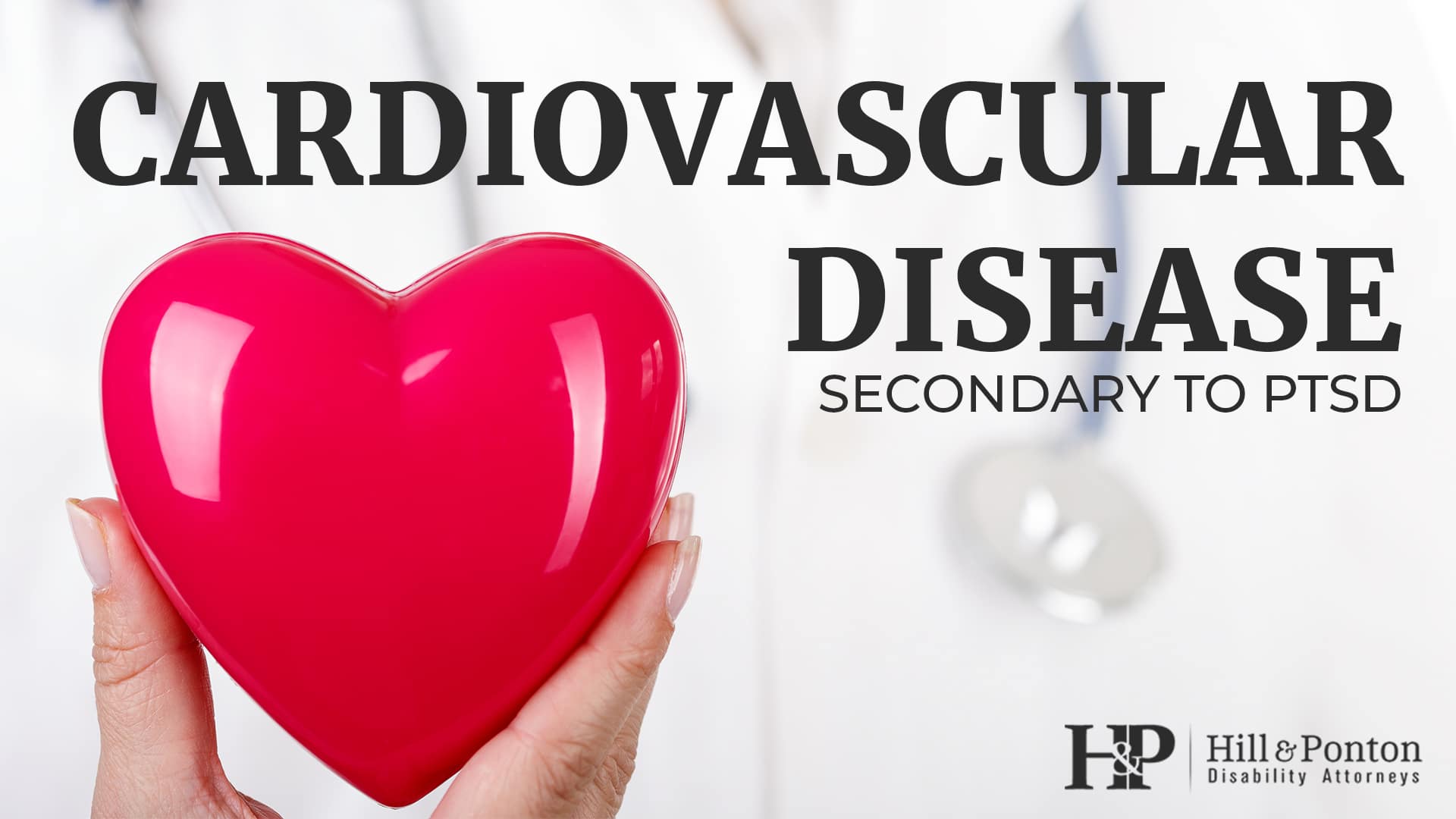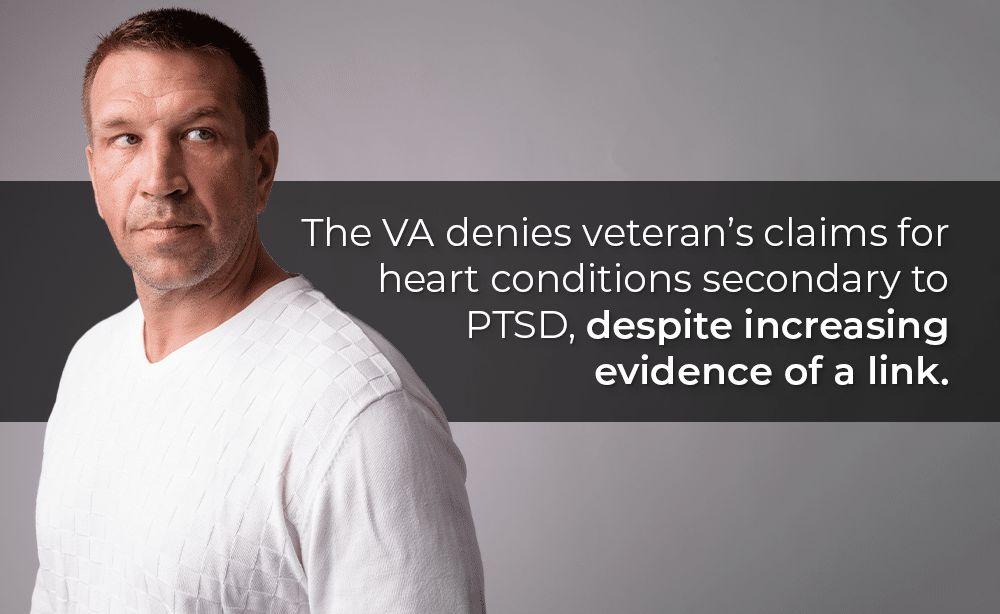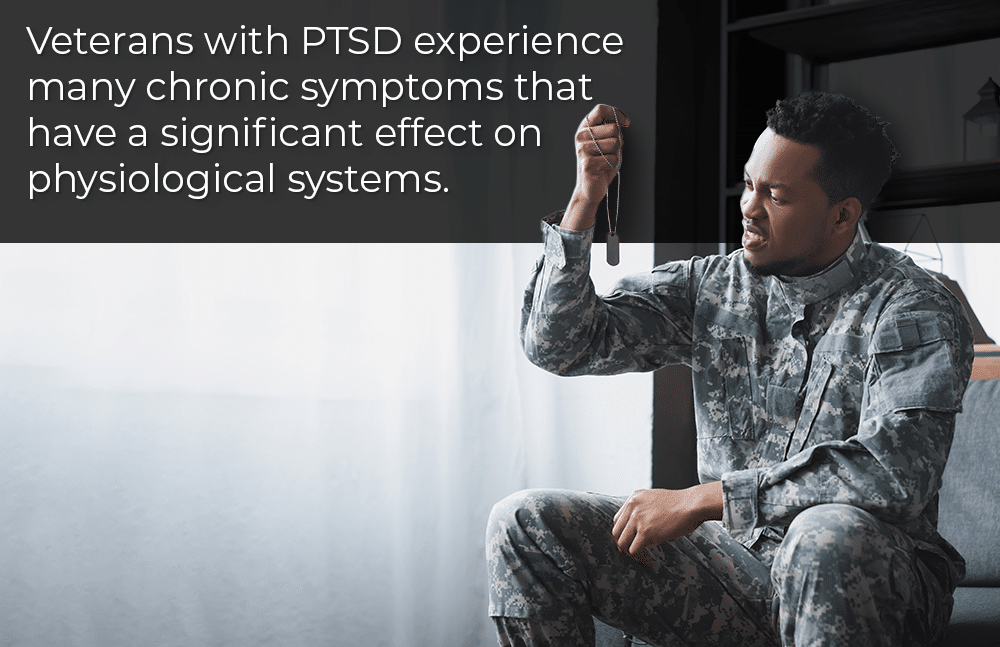PTSD & Heart Disease: Making a Claim for Benefits
Psychiatric disorders and physical illnesses are often linked, and the U.S. Department of Veterans Affairs often awards secondary service connection in these cases. Veterans may relieve benefits for anxiety disorders and depression secondary to certain disabilities. However, this isn’t always the case with heart disease secondary to PTSD.
Despite increasing evidence and published medical studies that there is a link between Posttraumatic Stress Disorder (PTSD) and cardiovascular disease, the VA continues to deny veteran’s claims for heart conditions secondary to PTSD. Mental health and physical health are closely linked, and the stress of PTSD can trigger cardiovascular disease risk.
The National Center for PTSD published a review on this link, which you can read here.
PTSD and Heart Disease: Understanding The Link
PTSD develops after exposure to particularly traumatic events. Its severity depends on the nature and intensity of the trauma. Recent studies have shown that it also depends on the susceptibility of the exposed person.
For instance, a study of a brain chemical called neuropeptide Y, which has been called the “resiliency hormone”, that is measured in blood or spinal fluid, suggest that Navy Seals and Green Berets tend to have naturally high levels of the hormone in the blood in response to acute stress. These high levels of the hormone could help explain their mental and emotional resilience. Lower levels of the peptide were found in people with PTSD, compared with those without the disorder. Interestingly, according to the study, the hormone is also implicated as a factor in heart disease, although its exact role is not yet clear. (Marine Resiliency Study, Dewleen G Baker M.D., VA San Diego Healthcare System, San Diego, CA, Funding Period: October 2009 – September 2012)
Veterans with PTSD experience many chronic symptoms that have been found to have a significant effect on physiological systems that over time have adverse effect on the body. There are four main symptoms of PTSD:
- Reliving the event
- Avoiding situations that recall the event
- Negative changes in beliefs and feelings
- Feeling keyed up also called hyperarousal
For veterans with PTSD, memories of the traumatic event can come back at any time, through flashbacks and nightmares. Memories are frequently triggered by sights, sounds and even smells. When they occur, people may feel the same fear and horror they did when the event took place.
PTSD’s Affect on The Heart
Those with PTSD may feel on constant alert and on the look-out for danger. These reactions cause a “fight or flight” response, which is how the body responds to danger and threats.
A cascade of hormones are secreted when this occurs, triggering changes throughout the tissues and organs of the body. The heart beats faster, arteries constrict, blood pressure increases. The body starts preparing for battle – glucose levels rise, platelets in the blood become sticker. It’s a normal life-saving miracle that is built within us if we find ourselves fleeing from imminent danger. But when this process happens many times over, in response to chronic emotional stress, the lining of the arteries gets damaged and the heart muscle weakens. It becomes more a destructive pattern than a protective one, creating serious damage to the circulatory system. This includes the blood vessels and arteries.You can read a systematic review of the evidence of this link here.
Over time, individuals experiencing chronic stress on the heart may develop risk factors for heart disease like high blood pressure. Coronary artery disease (CAD) is the most common type of heart disease. Some physicians also use the term coronary heart disease. This condition involves the buildup of plaque on the artery walls, which affects blood flow. CAD can lead to serious consequences like heart failure and heart attacks. Heart disease is also the leading cause of death for adults within the general population of the United States.
Keep in mind that these risks apply to veterans and non-veterans with PTSD.
Other CVD Risk Factors
There are several other factors that can increase your risk of heart disease. Unfortunately, these other comorbidities can make it more difficult to prove that a veteran’s heart disease is secondary to PTSD. According to the American Heart Association, these risk factors include:
- Hypertension
- High cholesterol
- Type 2 Diabetes
- Obesity
- Substance abuse
- Tobacco use
- Poor diet
- Lack of exercise
- Stress
Your risk of heart disease, heart attacks, and other cardiovascular events also increase with age. You may also have an increased risk if your parents had heart disease. Although the association between PTSD and cardiovascular disease is complicated by health risk behaviors such as smoking, obesity, and family history, there are many studies independent of traditional cardiac risk factors associating PTSD and heart disease.
If you have questions about your personal risk factors, be sure to see your doctor or a cardiology specialist. They can measure your physical risk factors like heart rate and discuss any other health problems that may lead to cardiac issues. They may recommend lifestyle changes like controlling substance use and eating a healthier diet to control these risk factors. These changes may also control other inflammatory diseases.
Making Your Veterans Disability Claim
Many times the VA denies claims for heart disease secondary to PTSD stating that a heart condition is caused by plaque built-up in the artery, without any further reasoning. Do not deter from pursuing your claim for heart disease if you were denied. As the medical community continues to explore additional mechanisms linking PTSD and cardiovascular disease, all neuroscience and cardiology research seems to be moving in the direction of establishing a direct causal link between PTSD and heart disease.
When making your claim, be sure to obtain plenty of evidence from a psychiatry professional and your medical doctor. Your self-reports of your condition will be stronger with evidence.
If the VA denied your claim for heart disease secondary to PTSD, the team at Hill & Ponton can help. Our attorneys can ensure that you have the health records and other evidence you need to appeal and support your claim, so you can receive the disability compensation you’re entitled to.







